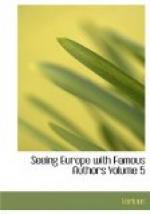About three English miles from the Great Belvedere—or rather about the same number of miles from Vienna, to the right, as you approach the capital—is the famous palace of Schoenbrunn. This is a sort of summer-residence of the Emperor; and it is here that his daughter, the ex-Empress of France, and the young Bonaparte usually reside.[B] The latter never goes into Italy, when his mother, as Duchess of Parma, pays her annual visit to her principality. At this moment her son is at Baden, with the court. It was in the Schoenbrunn palace that his father, on the conquest of Vienna, used to take up his abode, rarely venturing into the city. He was surely safe enough here; as every chamber and every court yard was filled by the elite of his guard—whether as officers or soldiers.
It is a most magnificent pile of building; a truly imperial residence—but neither the furniture nor the objects of art, whether connected with sculpture or painting, are deserving of anything in the shape of a catalogue raisonne. I saw the chamber where young Bonaparte frequently passes the day; and brandishes his flag staff, and beats upon his drum. He is a soldier (as they tell me) every inch of him; and rides out, through the streets of Vienna, in a carriage of state drawn by four or six horses, receiving the homage of the passing multitude.
To return to the Schoenbrunn Palace. I have already told you that it is vast, and capable of accommodating the largest retinue of courtiers. It is of the gardens belonging to it, that I would now only wish to say a word. These gardens are really worthy of the residence to which they are attached. For what is called ornamental, formal, gardening—enriched by shrubs of rarity, and trees of magnificence—enlivened by fountains—adorned by sculpture—and diversified by vistas, lawns, and walks—interspersed with grottoes and artificial ruins—you can conceive nothing upon a grander scale than these: while a menagerie in one place (where I saw a large but miserably wasted elephant)—a flower-garden in another—a labyrinth in a third, and a solitude in a fourth place—each, in its turn, equally beguiles the hour and the walk. They are the most spacious gardens I ever witnessed.
It was the other Sunday evening when I visited the Prater, and when—as the weather happened to be very fine—it was considered to be full, but the absence of the court, of the noblesse, necessarily gave a less joyous and splendid aspect to the carriages and their attendant liveries. In your way to this famous place of Sabbath evening promenade, you pass a celebrated coffee-house, in the suburbs, called the Leopoldstadt, which goes by the name of the Greek coffee-house—on account of its being almost entirely frequented by Greeks—so numerous at Vienna. Do not pass it, if you should ever come hither, without entering it—at least once. You would fancy yourself to be in Greece, so thoroughly characteristic are the countenances, dresses, and language of everyone within.




